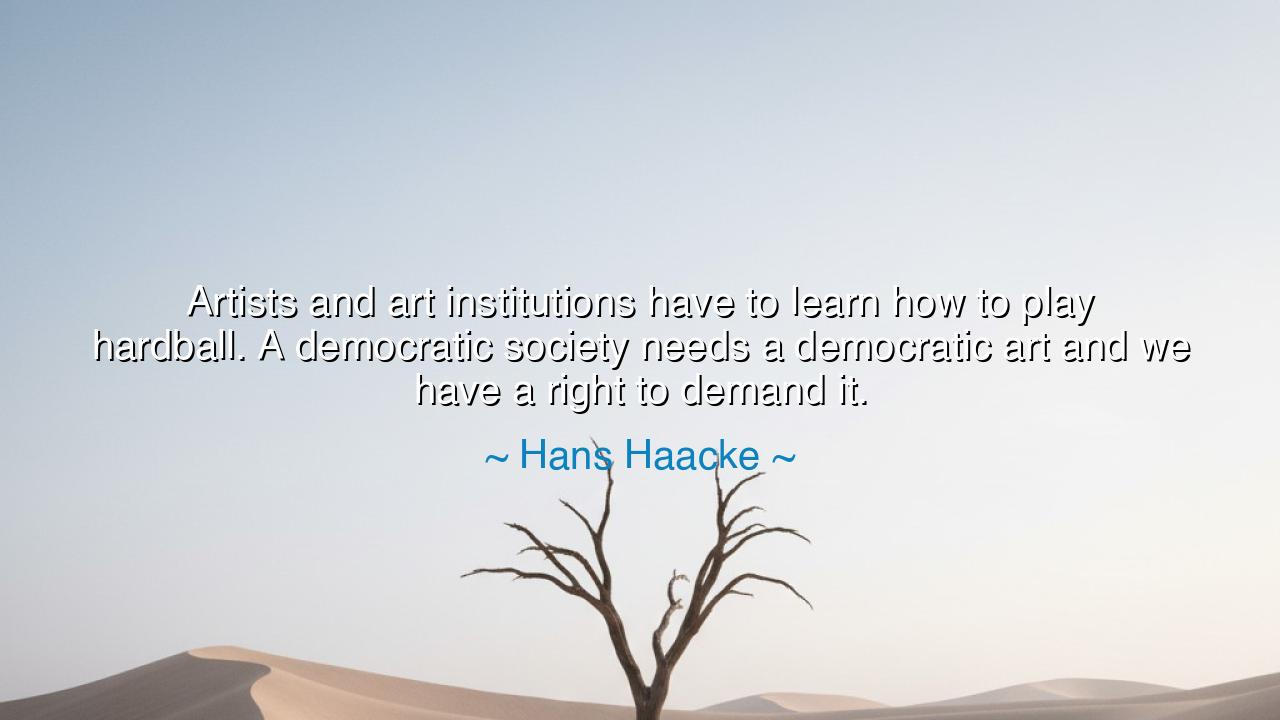
Artists and art institutions have to learn how to play hardball.
Artists and art institutions have to learn how to play hardball. A democratic society needs a democratic art and we have a right to demand it.






Hear the words of Hans Haacke, fierce and unyielding: “Artists and art institutions have to learn how to play hardball. A democratic society needs a democratic art and we have a right to demand it.” These words are not a gentle suggestion, but a battle-cry. They speak of the sacred duty of artists to resist silence, to wield their craft not as decoration but as weapon, mirror, and seed. For Haacke understood that where democracy exists, its lifeblood is freedom of thought and expression, and without art that dares to challenge and confront, that democracy withers into hollow form.
The origin of this proclamation lies in Haacke’s own life as a conceptual artist who defied the powers that sought to control him. His works unmasked corruption, greed, and hypocrisy in political and cultural institutions. Time and again, museums and patrons sought to censor him, to deny him space, to silence the truths his art revealed. Yet he did not bow. His declaration that artists must “play hardball” was born from struggle, from knowing that those who profit from silence will not yield their control willingly. He urged art institutions and creators to confront power boldly, to remember that art is not neutral ground but contested soil upon which the future of democracy is fought.
The ancients knew this truth well. In Athens, the playwrights were not entertainers only—they were philosophers, critics, and prophets. Through comedy and tragedy, they questioned leaders, mocked hypocrisy, and stirred citizens to reflection. Aristophanes, with his biting wit, dared to laugh at politicians in the open square. Sophocles, with his tragedies, dared to ask what happens when the law of kings collides with the law of conscience. These voices were the democratic art of their time, keeping the polis alive by refusing to be silent. Without them, democracy itself might have fallen sooner to corruption and decay.
History offers us another testament in the fiery work of Diego Rivera, whose murals gave voice to the struggles of workers and the poor. Rivera’s art was not soft, nor ornamental; it was hardball, painted across walls for all to see. When patrons like Rockefeller sought to control his vision, demanding he erase the figure of Lenin from a mural, Rivera refused, and the work was destroyed. Yet the spirit of defiance lived on. Rivera proved that art, when it is truly democratic, cannot bow to the dictates of wealth or authority—it must speak for the people, even at great cost.
The meaning of Haacke’s words, then, is revealed: a democratic society requires art that is unafraid, art that belongs not to the powerful but to the people. If art becomes only entertainment for the elite, if institutions polish it into something safe and sterile, then democracy loses one of its most vital guardians. To demand democratic art is to demand that art reflect all voices, not just the comfortable, and that it challenge injustice wherever it is found.
What lesson, then, should we who inherit these words take? First, let us not treat art as trivial or secondary, but as the forge in which conscience is tempered. Support the artists who disturb your comfort, for they keep democracy alive. Demand that art institutions reflect diversity, honesty, and courage rather than serving only as galleries for the wealthy. And if you are a creator yourself, heed Haacke’s call to “play hardball”: speak truth through your craft, even if it costs you patronage, even if it brings resistance. For only then does your art serve freedom, rather than chains.
Therefore, children of the future, inscribe this upon your hearts: without democratic art, there can be no true democracy. Just as free speech sustains law, so too does fearless creation sustain culture. Do not be lulled by the art that flatters or distracts. Seek the art that unsettles, that questions, that speaks the truths no one else dares. For in the fire of such art, society is kept alive, sharpened, and made ready to resist tyranny. And in this, Haacke’s teaching shall endure: art must be hard, honest, and free—or it is no art at all.






AAdministratorAdministrator
Welcome, honored guests. Please leave a comment, we will respond soon